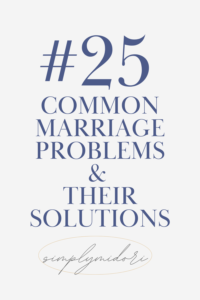Once in a while, someone of the opposite sex comes along who makes us feel sensational. Our emotions are so impressed with that person that we want to spend more time with them: they give us the feeling of love— an intimate connection.
We don’t merely find that person attractive. We find that person irresistible! And along with that feeling goes a desire to spend our lives with whoever has that high Love Bank balance.
Marriage is an easy choice when we feel in love. That’s how you probably felt when you were first married. You were in love. You met each other’s most important emotional needs so effectively while dating that you couldn’t imagine being apart—or out of love.
Once married, a couple’s new responsibilities prevent them from doing as well as meeting each other’s emotional needs. Dirty fighting starts if the couple continues not to meet each other’s needs.
Recommended Reading: How To Overcome Intimacy IssuesTwo people previously in love now view each other as annoying and selfish. Neither partner tries to be thoughtful as they did before marriage. Eventually, they lose their feeling of love for each other, and the fighting intensifies.
There is a fair way to fight and an unfair way to fight. This blog will explore how romantic partners fight dirty and show how these techniques consistently hurt us and our marriage.
5 Phrases To Avoid In A Conflict
If marriage were a game, these phrases would get you a penalty or a foul every time you use them, WITHOUT EXCEPTIONS!
If you combine these phrases with the following dirty fighting techniques, chances are high that your relationship will fail:
-
“You always/never …”
-
“You should/could have …”
-
“Why didn’t you? …”
-
“I would have …”
-
“You make me …”
Dirty Fighting Techniques
Couples reach a point where they no longer care about their spouse, but on winning the argument. When this happens both spouses start fighting dirty to win! Unfortunately they may win the argument but start ruining their marriage.
We Use Blame To Fight Dirty: “THIS IS ALL YOUR FAULT.”
When couples use the dirty fighting tactic of blame we can guarantee the argument will shift into no man’s land and you will spend your time trying to identify the real culprit in your disagreement.
Whose fault is it? Who owns this problem, and who is the innocent bystander?
The problem is that, in most cases, neither of you feels entirely responsible for the conflict. No matter what you say or do, your partner always shares some of the blame.
Remember, relationship disputes have three invisible conversations that take place within it:
-
The “What Happened?” Conversation
-
The “Feelings” Conversation
-
The “Identity” Conversation
That means that while blaming your spouse for “what happened,” they may blame you for hurting their “feelings.”
There are different things to be responsible for in an argument, and it rarely helps to pin the blame on one party alone.
How To Stop Blaming
To stop blaming, it’s helpful to make a simple mental adjustment: Try to think of your relationship as a third party, almost like another person. There’s me, there’s you, and there’s us.
Whenever there’s a problem in the relationship, regardless of who appears at first to be at fault, we have a problem.
That little shift in attitude will encourage you to search for your part in the problem and keep you from steering the conflict up a dead-end street.
But aren’t there times when one person is to blame? Is it wrong to ask your partner to accept responsibility for his actions? Not at all; the question is, what’s the best way to get your partner to accept responsibility?
You’ll find it much more productive to simply discuss the issue until your contributions to the problem are clear. It’s easier on the ego to accept responsibility than to have it dumped in your lap.
We Use “YOU STARTED THIS” When Fighting Dirty
Similar to blaming is the tendency to try to identify the originator of the disagreement. If you started it, after all, then the problem belongs to you.
“I was just standing here, minding my own business, when you said …” But of course, couples rarely agree on precisely when a disagreement began. Each believes their anger is only a response to something their partner did first.
And the fact is, they’re both right: For him, the argument began five minutes ago when she said, “____.” For her, the argument began last Tuesday when he___.
For each of them, their anger or frustration is just a response—but they’re responding to different things.
Solution To Deciding Who Started It
Trying to agree on what started all this is usually a waste of time. You may find it helpful to discuss what started it for you, but only to help your partner better understand your perspective. Every argument has two different starting points; and when fighting fair the goal is to have the same finish line.
Great Reminder—Because men place so much emphasis on performance and competence, they are especially sensitive to blame.
We Drudge Up Past Mistakes To Fight Dirty: “THIS IS LIKE THE TIME WHEN…”
It’s human nature to search for patterns in complex situations; patterns help us make sense of the strange and unfamiliar. But it doesn’t help a conflict when we insist on comparing the present situation to past mistakes.
We hope that it might be a kind of shortcut to refer to the historical record. Why go into all the confusing intricacies of this disagreement when we can just compare it to one from the past?
“Remember the fight we had about? This is just like that one. You were wrong then, and you’re wrong now.”
Solution To Drudging Up The Past
The past is really almost as much a work of the imagination as the future.
Chances are your partner isn’t likely to agree to this pattern you’re trying to piece together. To them, this disagreement is a unique situation; it may have some similarities to the past, but your attempt to equate this disagreement with one from days of the past feels to them like a stretch. Never mind about then; what about now?
Are you willing to deal with the messiness of this situation, or will you simply pigeonhole it in the past? History lessons are almost always unproductive because they take the discussion on a tangent.
Instead of discussing the present, we’re arguing about the past. Is this like that other time? Is it just like that other time? It’s difficult enough to resolve the problems of the present day; dealing with all of history can be downright exhausting.
We Use “YOUR EXACT WORDS WERE …” When Fighting Dirty
Sometimes, a conflict accelerates over using a specific word or phrase. In those situations, you want your partner to face up to the source of the offense. “That’s not what you said. What you said was____.” But much to your dismay, your partner often disagrees about what was actually said, leading you once again on a tangent: Who said what to whom?
We’ve all seen enough TV courtroom dramas to know that when there is confusion over a piece of testimony, all we have to do is send the court reporter to read from the official record. We hope we’ll be able to do the same thing in our own conflicts, substituting our fallible memory for the written transcript.
Solution To No, That’s Not What You Said
Avoid it. It doesn’t work. Human communication is a multichannel event. It involves subtle facial expressions, minute variations in tone of voice, and almost imperceptible movements of the eyes. And words themselves are not simple; they have connotations and nuances that sometimes communicate far more than the word itself.
When an offensive word or phrase is spoken, the offense is often the collective impact of a multichannel message. What was it that really bothered you—the word itself, the connotation of the word, or the way that it was spoken? All are a part of what was said.
And that’s why we can’t always agree on the official record. So why bother? Instead of insisting on your version of what was said, ask them to say it differently. Keep the focus on the meaning and not on the words themselves. Try to listen for the hurt, fear, or disappointment in what your partner is really trying to communicate. Be compassionate as you listen.
We Turn The Tables Around When Fighting Dirty: “ME? WHAT ABOUT YOU …?”
Reversal is a form of defensiveness. Sometimes, our objection is not to a specific word or phrase but to the person raising the objection. “How can you accuse me? Why do you criticize me for this when I overlook so many things with you? What about all the times when you …?”
While defensiveness is a process of building a protective barrier, reversal is the strategy of achieving victory through quick counterattack. Reversal is like seeing a live grenade roll into my bunker. Instead of diving for cover, I grab the grenade and lob it back before it has time to explode.
Instead of carefully considering your words, I simply throw them back at you. After all, if they can hurt me, they can hurt you too. Another form of reversal is to respond to a complaint with an unrelated complaint of your own. This method is guaranteed to make your partner feel insecure when sharing his or her thoughts/ feelings with you.
Solution To Turning The Tables Around
Instead of throwing your spouse’s own words back at her (“So I’m lazy? Well, so are you!”), this approach simply ignores the attack and mounts an attack of its own. “So I’m lazy? Well, I’d rather be lazy than sloppy!”
The goal is to shift your partner’s focus from furthering their complaint to defending from one of your own.
The problem, as with all defensive responses, is that you’re so busy returning fire that you never take time to consider the nature of the attack. Why did they throw the grenade in the first place? Is it possible that they had a good reason?
And if you throw this one back, will they just lob another? As painful as it may sound, we have to let the grenades go off. We have to be disciplined and courageous enough to patiently consider our partner’s complaint and try to save our own for another time.
We Use Comparison When Fighting Dirty: “WHY CAN’T YOU BE LIKE …?”
One of the most painful components of any conflict is the feeling of disapproval that seems to go with it. If you’re already feeling a lack of praise, encouragement, and grace—then a conflict is even more likely to feel like a personal failure.
It’s hard enough to feel that you’re doing badly; it’s even worse to be reminded that someone else is doing better. We sometimes use comparisons simply to help clarify our meaning. “I want you to spend more time with me the way Jim does with his wife.”
But to a person sensing disapproval, it sounds more like, “Why are you a failure? Why can’t you be a success like Jim?” That wasn’t the intended message, but comparisons attract unintended meanings like moths to a flame.
Is your complaint that your spouse doesn’t spend enough time with you or that your spouse isn’t that person? The desire to clarify is a good one, but avoid the temptation to illustrate through comparison to others. Comparisons have a way of generating conflicts of their own.
Here are four tangents that happen when we make comparisons
-
You seem to pay a lot of attention to Jim.
-
Apparently, you wish you were married to Jim.
-
Let me tell you all the ways that Jim is a failure.
-
I’m a lot better than Jim at …”
We Push Buttons To Fight Dirty: “WHY DO YOU HAVE TO ACT SO…?”
Buttons are control devices; they serve as switches that activate other devices. A button is always wired to something, and it isn’t always obvious what. Sometimes, a very large and dangerous machine can be set in motion at the touch of a very small button.
All of us have “buttons”: certain words, expressions, attitudes, or gestures that set us off—sometimes, we’re not even sure why. No one knows your buttons better than your spouse.
Marriage grants your partner access to your Master Control Panel, a tempting array of buttons of all colors and sizes. Throughout the marriage, we systematically push each one to find out what it does. Most seem to have little effect, but some actually launch ballistic missiles.
We always remember where those buttons are. When you tire of a disagreement, or when it isn’t going your way, it’s always tempting to push one of those buttons and initiate a nuclear catastrophe.
But make no mistake; that’s exactly what will happen. No one leans on the big red button by accident; your mate knows it, and so do you. By pushing your spouse’s button, you will completely obscure the original conflict, and you’ll be left with yet another conflict to resolve at a later time.
We Use Logic To Fight Dirty: “WHY CAN’T YOU BE MORE RATIONAL?”
There are all kinds of paths from point A to point Z, and when it comes to logical thinking, we seldom take the same route. Some of us are free-form, intuitive thinkers who reach our conclusions creatively and unpredictably; others are linear, point-by-point processors who approach their convictions more deliberately.
Solution To Logic
Nowhere do these differences become more apparent than in conflict. You may attempt to lead your partner step-by-step down the unerring path to your inescapable conclusion, only to find that they have ignored the path entirely and are cutting a trail through the woods, arriving (of course) at a conclusion on their own.
What did you expect? If only they would think the way you think. If only they would be more logical.… Asking your partner to think as you do is no different than asking them to see colors the way you see them.
We have to allow one another the freedom to proceed according to our own style of thinking and focus on our conclusions rather than our means of getting there.
Conclusion
We can all agree that dirty fighting will destroy relationships. It leads to:
–Making us feel guilty
-Our partner giving us the silent treatment
-Feeling attacked
-Both partners avoid responsibility
-Litany of other issues
When handling disputes from now on we hope you use some of the more productive ways that we outlined:
-Take Responsibility
-Focus On The Initial Issue
-Take A Time Out If Needed
-Avoid Saying Hurtful Things (You Know The Character Assassination Statements)
While we know all couples fight remember there are ways to argue productively, if you leverage the things you read above we guarantee you will have 1. fewer conflicts and 2. feel like intimate partners in a happy relationship!












